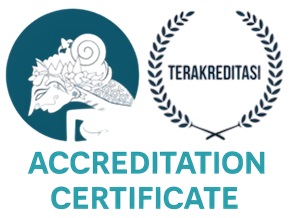Hubungan Tingkat Stres Dalam Belajar Terhadap Kejadian Akne Vulgaris Pada Mahasiswa/I Fakultas Kedokteran Universitas Tarumanagara Angkatan 2018
Abstract
Introduction: Acne vulgaris is an inflammation of the pilosebaceous follicles that begins to appear when a person reaches adolescence. There are several risk factors that can affect the onset of acne vulgaris such as genetics, hormones, weather, food, cosmetics, P.acnes bacterial infection, and stress. Stress can trigger an increase in androgen hormones that affect the increase in sebum production. Increased sebum can inhibit sebum secretion in pilosebaceous follicles and cause inflammation. This study was conducted to determine the relationship between stress in learning and the incidence of acne vulgaris.
Methods: The research method used is a cross-sectional analytic study with a total sample of 71 people. Data was collected by distributing questionnaires and observing facial photographs. Research data analysis using SPSS.
Results: 49 (69%) female respondents and 22 (31%), majority 53 (74.6%) respondents experienced moderate stress. Based on the assessment of Plewig and Kligman, it was found that most respondents had AV degree 1 as many as 57 (80.3%). The results obtained p value = 0.001 (p < 0.050)
Discussion: Medical faculty students have a high-stress level which impacts their physical and mental health. Stress can worsen acne by increasing the secretion of androgen hormones and can cause sebaceous gland hyperplasia
Conclusion: There is a significant relationship between the level of stress in learning with the incidence of acne vulgaris in students of the Faculty of Medicine, Tarumanagara University Class 2018.
Downloads
Copyright (c) 2023 Clara Alvionita Wongso, Hari Darmawan

This work is licensed under a Creative Commons Attribution-ShareAlike 4.0 International License.











